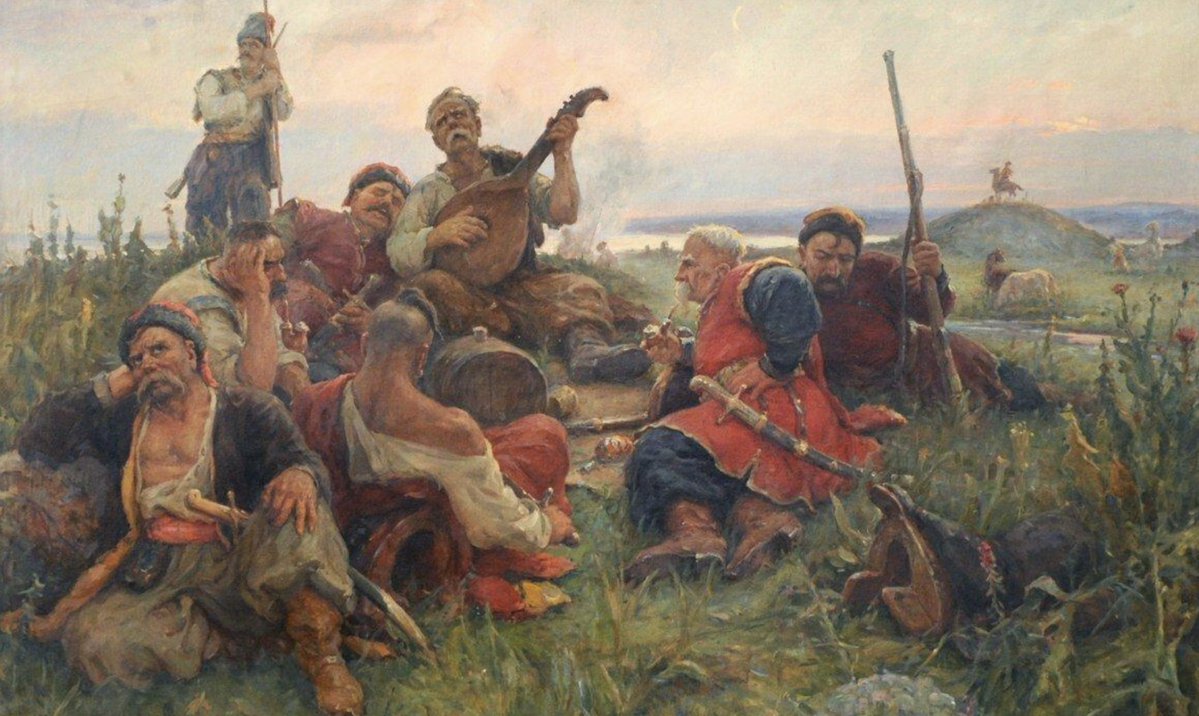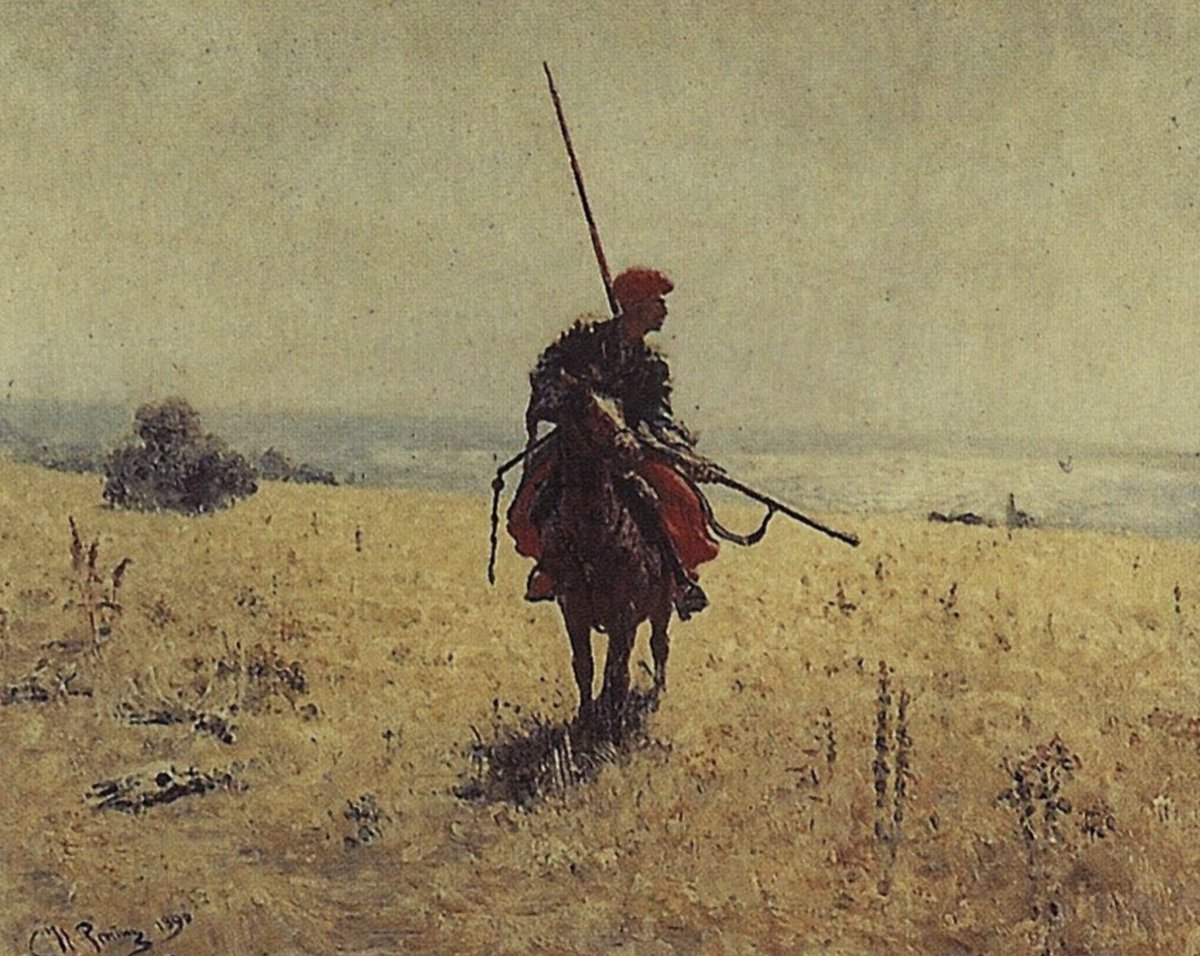Evolution of Stereotypes about Ukrainians in Russian Culture
Mariam Naiem · 26 Oct 2022 · Adapted from original Twitter thread
Russia’s war in Ukraine is a result of a centuries-old dangerous mainstream ideology of Russian chauvinism, and of the oppression this ideology has produced. Let’s take a look at the cultural dimension of this oppression through the lens of Russia’s stereotyping of Ukrainians.
I suggest thinking about Russian stereotyping of Ukrainians in terms of two stages. First, a “romantic” image before the 20th century (it’s worse than it might sound), and second, a “treacherous” twist of this image from the 20th century until now. I will talk about both next.
In the 18th–19th century Russian empire, there was a wave of interest in Ukrainian culture due to the ideas of Romanticism. During this time, Ukraine is viewed akin to “Russian Scotland”. Ukrainians become romantic heroes: Ukraine, its history, the way of life, and people’s customs become the object of romantic idealization. One of the reasons for such romanticization were the heroic images of the Cossacks: honest, brave, simple-minded, rude, uneducated, uncouth, and close to nature, that is, natural, people.


Here are the main stereotypes about Ukrainians that I have identified in eight works by known Russian 19th-century intellectuals (so that you do not have to read them ever). These stereotypes, in a way, become a basis for the modern stereotype of a Ukrainian.
Ukrainians Are Dumb
First stereotype: Ukrainians are uneducated and generally just not so bright. Here are some selected quotes. From “Letters from Little Russia [Russian chauvinist name for Ukraine]” by Alexei Levshin, Russian historian, writer, and ethnographer, 1816:
The superstitions and prejudices the Little Russians are subject to cannot be called vices because they are common to all peoples [“tribes”]: because all, especially unenlightened, people are infected with them. (Picture)
From “Articles and reviews. Articles about Pushkin” by Russian literary critic Belinsky, 1846:
These people would not have allowed civilization closer than a cannon shot to themselves and, even then, only to fool it with a spear and a whip. (Picture)
From “Guide to the study of the Russian land and its population”, 1867:
Little Russians preserved some of the shortcomings of underdeveloped tribes, such as vindictiveness and cunningness. (Picture)
Ukrainians Are Amusing
Because lack of culture is also “naїve” and “funny”, there is an inherent comicality in the image of the Ukrainian. This brings us to the second stereotype: Ukrainians are amusing.
From “Domestic studies. Russia, according to the stories of travelers and scientific research” 1864 – 1887:
The Russians […] make fun of the Khokhols [ethnic slur for Ukrainians], telling a lot of funny jokes [“anekdots”] about them, in which the Little Russians are exhibited as either extraordinarily naїve or simple-hearted or good-natured people: but naїvety, innocence, and kindness are rather good qualities than shortcomings. The reason for secrecy and distrust of the Little Russians towards the Russians must be sought in history. (Picture)
Ukrainians Are People of Nature
Third stereotype: Ukrainians are people of nature.
From “Letters from Little Russia”:
Blessed air and fertile land give these inhabitants the right to be called children of nature: if only it does not deprive many of them of the essential virtue for human well-being—hard work. (Picture)
From “Picturesque Russia. Volume Five: Little Russia, Podolia and Volhynia”, 1897:
A Little-Russian is the same “baby” nation as Great-Russians, but only with a more childish attitude to life and its phenomena. A Little-Russian is more of a child of nature than a Great-Russian. (Picture)
This Ukrainian “naturalness” pushes us to the following segregation: Natural relative to whom? To a “civilized man”, of course. That is, Russian.
All these stereotypes are pretty typical. This is how probably all empires have been looking at the cultures of their colonies: amusing in how untouched by Civilization and intelligence they are, and leading a natural lifestyle in isolation of Civilization.
From the age of Romanticism, we can clearly see the juxtaposition of a “civilized” Russian vs. an “uncivilized” Ukrainian. It is always a top-down view, a view of the older, wiser, cultured, and civilized on a younger and uncivilized brother. I wrote about this before. Attempts to challenge such a view, to demonstrate its ethnocentrism, end in a fiasco since they insult the Russian people: These jokes are loving. How these Ukrainians cannot understand it?
Ukrainians Are Traitors
Another interesting popular topic for Russian intellectuals of the 19th century was the idea of Russians and Ukrainians belonging to one big Russian nation (despite them clearly classifying Ukrainians as a distinct category). From “Picturesque Russia” yet again:
Both of these Russian peoples [Ukrainians and Russians] still have more in common than differences. Both Russians, both Orthodox; both have common enemies. Both fought for the greatness that Russia has achieved: both worked on Russian science and literature. Their differences are not only not harmful but also positively beneficial. They strengthen the bond: they make the Little-Russian and the Great-Russian indispensable to each other. It is impossible and unnecessary to erase these differences generated by the conditions of nature and all history. Little-Russian has always been Russian and will be. (Picture)
At the beginning of the 20th century, Ukraine had a brief moment of independence before becoming part of the USSR. The desire for political autonomy adds a new twist to the existing stereotypes: Ukrainians now also become traitors.
An example of such an attitude toward the Ukrainian desire for independence can be found in “The White Guard” by Bulgakov, 1925. Traitors and negative characters speak Ukrainian and sympathize with the Ukrainian cause. The main positive characters are bearers of Russian culture.
Of course, there could be no question of Lariosik being a traitor. In no case an intelligent person, and, even more, a gentleman who signed bills for seventy-five thousand and sends telegrams in sixty-three words, can be on the side of Petliura.
The desire for political sovereignty is perceived as something absolutely meaningless and irrational, the illogical behavior of Ukrainian savages who do not understand the benefits of civilization. The rejection of Russian culture is a voluntary transition to “barbarism” and the Ukrainian “pre-cultural” (that is, pre-Russian) period. Thus, the benign “untouched by civilization” image now develops into “savagery”. This, of course, got only exacerbated by the second controversial attempt at Ukrainian independence during the interwar and World War II period.
One of the interesting jokes (“anekdots”) on this topic: “One Ukrainian is a proprietor. Two Ukrainians are a partisan squad. Three Ukrainians are a partisan squad with a traitor.”
A related image of a “frenemy” arises around this time. A friend because early USSR media tried to portray Ukrainians as the best friends of Russians. An enemy, of course, because they are now also traitors.1 The traitor-frenemy idea develops into now the most prominent feature in the image of Ukrainians in Russian culture: irrational hatred of Russians. The (amusing, not smart) younger brother who hides his hatred and anger at the elder brother, without any reason, simply because of his narrow-mindedness. The Ukrainian blames the Russian for everything.
The idea of Ukrainians irrationally hating Russians became a popular topic for Soviet anekdots. This is one example:
(In mocking Ukrainian)
— Petro, Moskals went to Space!
— All of them?
(«Петро, москали в космос полетили!» «Що, уси?»)
Even though some of these stereotypes might look innocent, this is a typical imperialist point of view on the colonized culture: a derogatory top-down view. With time the prejudices of the “Romantic” time became a strong base for Russian Ukrainophobia. How quickly the amusing, uneducated, natural people became savages and traitors when they dared to reject the sacred Russian culture and have their own way.
Modern Russian attempt to subjugate Ukraine is not a new undertaking, but a centuries-old one. Otherwise, how come Russian imperialists sound the same in the 21st and 19th century?
Contrast Belinsky, 1846: “Little Russia has never been a state, and consequently it has no history, in the strict sense of the word” (Picture), and Putin, in his infamous speech on the 23rd of February, 2022: “Ukrainian state is entirely a creation of Russia.”

-
Note: Initially, I used an image from the Perets magazine. Although it is representative, it is not the best illustration in this essay because the author is Ukrainian. ↩